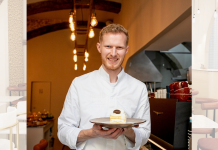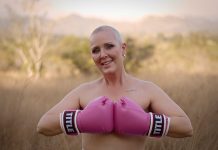At the tender age of nine, Mbombela’s Arleen Pretorius started having difficulty seeing what was written on the blackboard at school. She started wearing spectacles, but they only offered a temporary respite.
When Arleen’s schoolwork started to suffer, teachers advised her parents to enrol her in a study group, believing that she had difficulty studying. It was only after she had joined the
group that she discovered it was her struggling vision that was having an impact on her work and her studies, and an optometrist referred her to an ophthalmologist in Johannesburg for further examination.

“After enduring a number of tests, he referred me to a professor at RAU in Johannesburg,” Arleen explains, “to confirm diagnosis as well as suggest suitable equipment for me to use to assist me at school.” The tests confirmed Stargardt disease, a rare and incurable genetic macular degeneration that affects the retina, which is light-sensitive tissue lined at the back of the eye. Stargardt disease disturbs the vision, resulting in central vision loss and sensitivity to bright lights. “Studies find that Stargardt only affects every third generation,” says Arleen, “and a few years later my brother was diagnosed with it as well.”
Arleen received various implements to help manage the condition, among them a ball-shaped magnifier, small binoculars and a set of glasses with binoculars attached in front and positioned perfectly to match the shape of her eyes. “At first this seemed fine. I thought it would be wonderful when it came to my schoolwork. But I never realised how this would affect me at school,” she admits. “I remember feeling very embarrassed in primary school. Children would use insulting words or even become physically abusive towards me when they saw me trying to use the binoculars in class. And because this was a condition that no teacher had ever come across, they weren’t really sure how to deal with it,” she says.
“They were advised to enlarge my lesson material from A4 to A1, but the first time I received my exam sheet in this size in front of the entire class, the teachers quickly realised that it wasn’t going to work, and that it was best to cut the test into smaller pieces and attach them together instead.”
During high school and college, Arleen was able to cope a little better with her condition. “Despite being diagnosed with Stargardt, I like to push my limits,” the bubbly and petite mum smiles. “I didn’t really participate in school sport, but I did take part in the choir. I
also did gymnastics and my ultimate favourite things were Spanish and modern dancing,” she remembers.
As time passed, Arleen taught herself to utilise her other senses more effectively, paying close attention by listening and making memory notes. “People who have trouble with their
sight will know this technique, to listen with an extremely fine ear. You teach yourself to memorise many things that make up for the lack of being able to see properly,” she smiles. “Even so, there are many challenges, things that I struggle with on a daily basis, such as not being able to drive and being dependent on transport services and family,” she adds. Knowing exactly where she has put things helps Arleen to perform daily activities and tasks
without any difficulty.

One of the things she enjoys most is cooking and baking with her daughter, Jessica, and she loves exploring nature and going on family camping trips, although she is limited to certain hiking trails. She also loves going to the Kruger Park with her family, the aid of her trusty binoculars making viewing a pleasure.
Jessica has been raised knowing that her mum has low vision. She often takes the initiative, helping Arleen when she notices her having trouble reading. “Jessica is such a caring child; it comes naturally for her to assist me with certain things, for example reading the subtitles on a movie or ingredients on a packet. And my husband, Heins, has the world’s patience. He drives me to appointments and helps me with any other duties or tasks. I must honestly say that my family is very supportive and inspires me to endure through any difficulties I may face from time to time,” Arleen says.

“There is not a single member of the family who does not contribute and help me to pursue my career. I’m a qualified beauty therapist, but focus mainly on treatments such as massage therapy. My friends are aware of my condition and treat me as an equal. To be honest, most people wouldn’t even know I suffer from Stargardt disease unless I tell them about it. There are some extreme cases of Stargardt in which the person may have severe vision loss, but I am grateful and blessed that I can manage on my own without extensive assistance.”
While it can be frustrating at times, Arleen chooses to see the positive side, embracing being different and using her talents to her advantage. “You are still able to achieve your goals, just as much as someone with 20/20 vision is,” she adds. “My vision is 6/36, and every day I try to do my best in my career as an individual, and as a mum, wife and friend. Let your presence linger with those who don’t have a disability. Live a life that shows people everything is possible when you set your mind to it!”
Details
For more information on support groups, visit Retina SA – A cure in sight on Facebook






